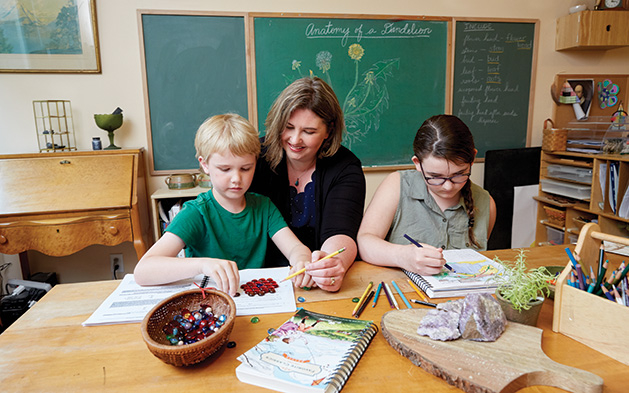My wife, Kristen, has been a teacher for 14 years within two different school districts in the Denver metro area. I might be biased, but I think she is a pretty fantastic teacher! Over the past month, COVID-19 has changed many of our lives. One consistent change has been it has turned most parents into teachers. I asked her to write a few quick tips for those of us coping with becoming teachers overnight.
One would think everyone being at home without a commute to work or school would give us more time in a day, but recently time feels shorter in our family. As an educator, I have a unique perspective on what families are dealing with right now. As a parent, I have personal experience. Attempting to work from home, keeping up with housework, and helping children work through their school day is leaving parents exhausted, frustrated, and pulled in too many directions.
Balance Structure and Flexibility with Proactive Measures
As an educator and parent, I know children thrive with routine. Children like knowing what comes next and feel more secure and safe when there is a set structure in their day.
School days and weekends should still feel different. Try to keep some aspects of a routine when your child has school work to do at home. What does that look like? Do they need to set an alarm? Know your child and what works best for them, but ultimately keeping some structure means that you should sit down with your child and set expectations. After they wake-up on a school day, they will take care of personal hygiene, get dressed, come to eat breakfast and then meet with a parent for a morning check-in about their day. Make the routine work for you and your family. Talk through these systems over a weekend and let your child have some input on what works best.
Proactive Systems to Add Structure
Morning Check-in: 10-15 minutes
- Look at the learning goals for their subjects that day
- Set a to-do list by reviewing all the tasks – write in a planner, on paper, on a whiteboard, etc., give the satisfaction of crossing off, erasing, or checking things they have completed
- Give a choice about what order they accomplish these tasks
- Teaching Moment: most people are more productive at the beginning of the day, encourage your child to put the most difficult or disliked task first to get it out of the way
- Give reminders about some proactive systems (see below) your family has agreed upon
- Include breaks and ideas for breaks- set times for lunch, outside playtime, etc.
- Teaching Moment: talk about a “growth mindset” when they are doing their work.
- Give a choice about what order they accomplish these tasks
End of Day Check-in: 10-15 minutes
- Look back at learning goals for subjects that day
- Look at check-list of what was accomplished
- Is there anything that needs to be pushed to tomorrow?
- Were there things that went really well? Why?
- Give genuine positive feedback for the growth in knowledge, independence, the reflection you see in your child
- Were there parts that were really tough? Why?
- Teaching Moment: Encourage independence- ask guiding questions to give your child ownership over mistakes and if they might do differently in the future
Define Urgent vs Non-urgent Issues
All of us parents are trying to get work done during the day while also being there for our children. If you let your child interrupt you whenever they want, trust me, they will do it all day. You need to discuss whether or not issues warrant interruption to parents (especially when you are trying to work)
- Encourage your child to “try 3 before me” by looking or attempting to solve the issue in 3 places before they come to you
- If they can’t solve the issue, they can give you a message without interrupting, skip past that issue and come back to it when you can help at a later time
- Set a non-verbal signal your child can give you for a non-urgent issue (hand motion or something written on paper)
- Make a “Parking Lot” for questions (i.e. write the question on a sticky note and put it on your desk or door, a specific notebook in the kitchen, etc.)
Designated Work Spaces
As noted early, children work better when there is consistency. That includes having a consistent work environment. Help them set a couple of designated workspaces in your house.
- Help your child set-up a few workspaces they can choose from- have them pick one for certain subjects, times of the day, etc.
- Don’t let switching become a time suck that allows them to procrastinate
- Make sure these spaces are distraction-free and talk about how they will be a successful student in each space
- What will success look like when I’m using the ____ for school work?
- i.e. – When I’m in my room using the reading nook for school work I will only need my book to read and maybe a stuffed animal to snuggle with. When I’m on the couch using a lap desk, I’ll make sure the TV is off.
Set Them Up for Success
Part of being successful is having the tools needed to succeed. Set-up routines for resources they need to use-
- write down passwords in an easy place for your child to access
- bookmark common websites used in their assignments
- Set-up a consistent place to write the order of their day during your “Morning Check-in”
Hopefully, there are a few ideas here that work for your family. While this time is tough on all of us, remember, this will (probably) be the only time you get to spend with your children like this. Enjoy the time and use some of the tips above to set everyone up for success.

